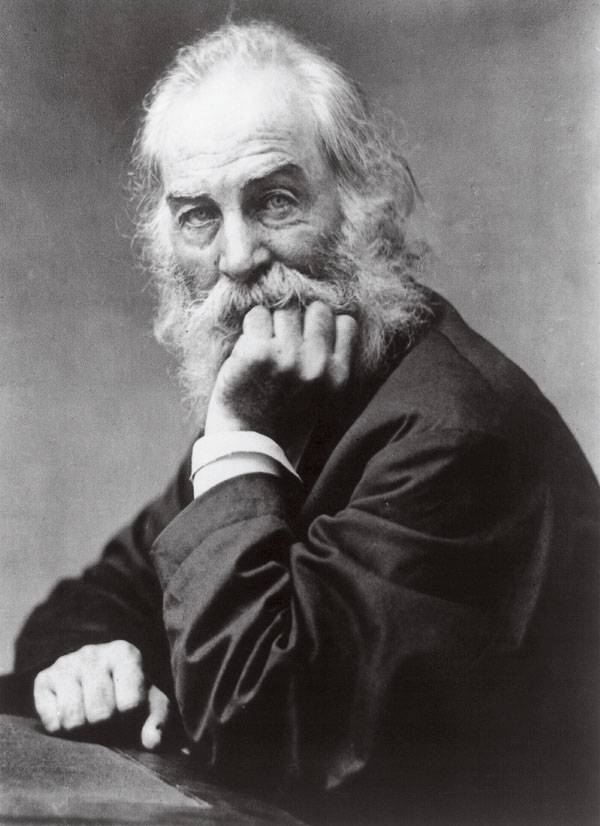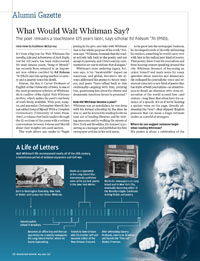Alumni Gazette
 (Photo: Library of Congress)
(Photo: Library of Congress)It’s been a big year for Walt Whitman: his novella, Life and Adventures of Jack Engle, lost for 165 years, has been rediscovered; his most famous poem, “Song of Myself,” has recently been reissued in an important new edition coedited by Ed Folsom ’76 (PhD); and this spring marked a century and a quarter since his death.
Folsom, the Roy J. Carver Professor of English at the University of Iowa, is one of the most prominent scholars of Whitman. He is coeditor of the digital Walt Whitman Archive, which makes the poet’s vast body of work freely available. With poet, essayist, and journalist Christopher Merrill, he’s just edited Song of Myself: With a Complete Commentary (University of Iowa Press, 2016), a volume that leads readers through the 52 sections of the poem with a written conversation between Folsom and Merrill about their insights into each section.
The work allows any reader to “begin joining in the give-and-take with Whitman that is the whole purpose of his work,” Folsom says. “Whitman demands that the reader actively talk back to the poetry and not accept it passively, and Chris’s and my commentaries set out to initiate that dialogue.”
Whitman’s most enduring legacy, Folsom says, is his “incalculable” impact on American, and global, literature. He always addressed his poems to future readers, and poets “have talked back to him continually—arguing with him, praising him, questioning him about the diverse and democratic American future he promised.”
How did Whitman become a poet?
Whitman was an autodidact; he was done with his formal schooling by the time he was 12, and he learned by reading books he took out of lending libraries and by visiting museums and by walking the streets of New York and Brooklyn. He learned typesetting as a teenager and published his first newspaper articles in his mid-teens.
As he grew into the newspaper business, he developed a style of directly addressing his readers, something he would carry over with him to his radical new kind of poetry. That poetry drew from his journalism and from hearing orators speaking around the city. Whitman dreamed of becoming an orator himself and made notes for many speeches about America and democracy. He reshaped his journalistic voice and oratorical voice into a new kind of poetry that has traits of both journalism—an attentiveness to detail, an obsession with close observation of the world around him—and oratory—long lines that often have the cadence of a speech. It’s as if we’re hearing a spoken voice on the page, directly addressing the “you”—that slippery English pronoun that can mean a single intimate reader or a world of strangers.
Where do you suggest someone begin when reading Whitman?
His poetry is about a celebration of the single, separate individual and, at the same time, the celebration of the “en-masse,” the wild diversity of a nation that manages to stay unified while “containing multitudes.” Nowhere is this fluctuation between self and cosmos, individual and nation, better seen than in his longest and best poem, “Song of Myself,” a work that every American owes it to herself or himself to read.
What’s the significance of his newly rediscovered fiction?
The discovery of Jack Engle is extremely important because, for the first time, we have fiction written and published by Whitman after he had started writing the poems that would be included in his first edition of Leaves of Grass. Before this discovery, the latest known fiction by Whitman was published in 1848, and that always made it easy to assume that Whitman gave up fiction and took up poetry, since we had a convenient seven-year break between the last known fiction and the radical new poetry. Jack Engle was published in 1852, Leaves of Grass in 1855. Whitman had begun publishing his new free-form radical poetry in newspapers in 1850, so we now know that the poetry and fiction were mingling in ways we had never before known.
This makes us rethink everything we thought we knew about Whitman’s early writing career. Scholars and critics will be working on the implications of this for many years to come. We can now see that Whitman in the early 1850s was still unsure about what form his life’s work would take.
The nature of democracy is under discussion around the world right now—and it’s a subject with which Whitman himself was deeply concerned. What can people learn from reading his work?
When Whitman first began making notes toward the poem that would become “Song of Myself,” he jotted down “I am the poet of slaves and the masters of slaves.”
He was trying to assume a voice, in other words, that was capacious enough to speak for the entire range of people in the nation—from the most powerless to the most powerful, from those with no possessions to those who possessed others. If he could imagine such a unifying voice, he believed, he could help Americans begin to speak the language of democracy, because if slaves could begin to see that they contained within themselves the potential to be slavemasters, just as slavemasters contained within themselves the potential to be slaves, then slavery would cease to exist, because people of the nation would begin to understand that everyone is potentially everyone else, that the key to American identity is a vast empathy with all the “others” in the culture.
In “Song of Myself,” Whitman says “I am large, / I contain multitudes,” and this voice that is vast enough and indiscriminate enough to find within itself all the possibilities of American identity would become the great democratic voice, a voice for the citizens of the country to aspire to. Today, the nation is so divided in political and social and economic and racial ways that it has become impossible to imagine a single unifying voice that speaks for America. Every voice that claims to speak for the “American people” today is in fact a divisive voice, alienating as many Americans as it unifies. So Whitman seems more important now than ever.
It’s hard work to make the imaginative leap to a fully democratic voice, one that celebrates diversity and finds strength and unity in the wild variety that defines this nation. Whitman knew it would be difficult, perhaps impossible. During his lifetime, Whitman experienced a massive civil war, an entire generation of American men destroyed, when the union could not contain its multitudes and came apart at the seams. I think he would sense a similar danger today.
Visit the Walt Whitman Archive at Whitmanarchive.org.

